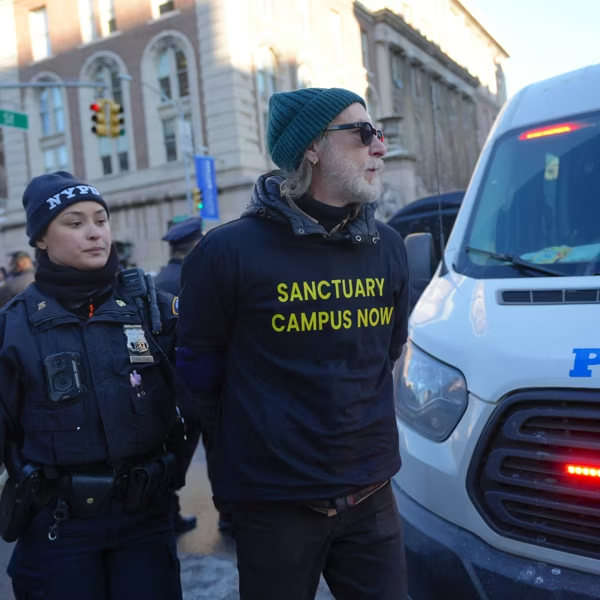Repercussions of American universities' crackdowns on student protesters are becoming increasingly evident this week as faculty members, public speakers, and others who collaborate with higher education institutions announced they would cut ties with schools that have repressed students' constitutional right to protest against Israel's U.S.-backed assault on Gaza.
On Thursday, Dipali Mukhopadhyay, a former Columbia University professor who is still affiliated with the school's Saltzman Institute of War and Peace Studies, announced on social media that she had written to Columbia President Minouche Shafik to ask that her "current affiliation with the university be removed."
"I have watched with horror as your administration has responded with breathtaking incompetence and inhumanity to peaceful student protest against genocidal violence ongoing in Gaza," wrote Mukhopadhyay. "As a teacher and a scholar, I can no longer justify my association with this institution so long as you are at the helm."
Mukhopadhyay's letter to the prestigious Ivy League school came two days after the New York Police Department forcibly removed student protesters from Hamilton Hall, which they had occupied to demand that Columbia divest from companies that contract with the Israeli government. The officers entered the building—which the students had renamed Hind's Hall in honor of a six-year-old girl who was killed by Israeli forces in January—with guns drawn, and reportedly used tear gas to disperse demonstrators outside.
On Wednesday, End Climate Silence founder Genevieve Guenther announced she was canceling her scheduled keynote address at Columbia's symposium on climate and language, which she was supposed to give Friday.
Guenther expressed sorrow that she would not move forward with the talk, but said that being associated with Columbia "at this political moment" was equivalent to ignoring the school's "authoritarian response to protest."
"Climate protest is being systematically criminalized in the U.S. and even in Europe and the U.K.," said Guenther. "And these authoritarian, anti-First Amendment tactics are not only deployed by the right. Yes, the right wing is targeting climate protests. But Democrats are deploying the same tactics to prevent direct action in support of the lives of Palestinian civilians in Gaza."
Guenther added that she was "deeply ashamed to be associated with this university" as a Columbia graduate, and that she "would FEAR to send [her] son to a place that turns the NYPD in full riot gear on students occupying a building that has been occupied many times before and survived just fine."
Also in New York, Deborah Archer, president of the American Civil Liberties Union, said this week that she would no longer be speaking at the City University of New York School of Law's (CUNY Law) commencement ceremony due to the school's decision not to allow students to give speeches at the event.
The law school quietly made its decision last September, weeks before Israel began bombarding Gaza in retaliation for a Hamas-led attack on October 7, in response to last year's commencement speech by Fatima Mousa Mohammed, who spoke about Israel "murdering" Palestinian civilians. The school publicly disavowed Mohammed's comments under pressure.
As the school community learned of the prohibition on student commencement speakers, eight students filed a lawsuit last week, and on Monday, Archer said she was withdrawing from her speaking engagement.
"I cannot, as a leader of the nation's oldest guardian of free expression, participate in an event in which students believe that their voices are being excluded," said Archer. "I feel compelled to decline the invitation under the circumstances."
Two renowned authors also informed University of Southern California (USC) on Sunday that they will not speak at upcoming events due to the school's deployment of armed officers to arrest 93 student protesters in recent weeks and its decision to keep 2024 valedictorian Asna Tabassum, a Muslim supporter of Palestinian rights, from delivering a commencement address.
"To speak at USC in this moment would betray not only our own values, but USC's too," wrote C Pam Zhang and Safiya Noble. "We cannot overlook the link between recent developments and the ongoing genocide in Palestine."
"Our withdrawal is in no way a condemnation of USC's graduating class, who deserve to be celebrated; nor do we condemn the countless USC faculty, staff, students, and administrators whose views are not represented by university leadership's authoritarian decision-making," the authors added.
Zhang and Noble, who had been scheduled to speak at USC's doctoral and master's degree commencement ceremonies, called on speakers at the graduations of 38 USC satellite campuses "to join us by signing this letter; withdrawing from USC events; and supporting USC students, as well as thousands of students nationwide who deserve respect, not arrest and punishment by their own universities, for courageously speaking truth to power."
Last week, more than 2,100 academics from across the globe signed a statement expressing solidarity with student and faculty protesters and supporting an "academic and cultural boycott" of the school.
Former New Yorker editor Erin Overbey on Wednesday called on "all journalists of conscience" to boycott the Pulitzer Prizes, which are administered by Columbia and are set to be awarded next week. The NYPD threatened student journalists and Columbia School of Journalism Dean Jelani Cobb with arrest during its raid of Hamilton Hall this week.
"Can't wait for the president of Columbia University to tell my industry what's good journalism at the Pulitzers next week," said Matt Pearce, president of the Media Guild of the West. "Try not to trip over any hogtied student journalists while collecting your award."
While the Pulitzer Prize Board on Thursday put out a statement praising "the tireless efforts of student journalists across our nation's college campuses, who are covering protests and unrest in the face of great personal and academic risk," it faced criticism for using passive voice when noting that the NYPD "was called onto campus" at Columbia.




